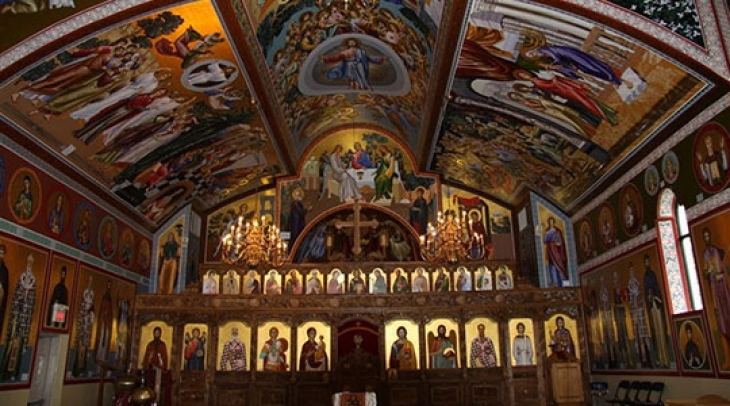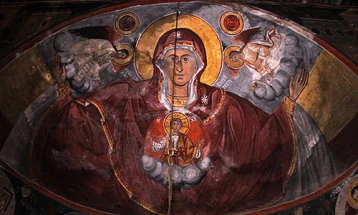Religious calendars
- Macedonian Orthodox Church Calendar; The Nativity of St John, the Forerunner and Baptist of Christ
- Post By Silvana Kocovska
- 10:07, 7 July, 2024

7 July 2024 (MIA)
Macedonian Orthodox Church Calendar
The Nativity of St John, the Forerunner and Baptist of Christ
Six months before his appearing to the most holy Virgin Mary in Nazareth, the great Gabriel, archangel of the Lord, appeared to Zacharias the High Priest in the Temple in Jerusalem. Before he revealed the miraculous conception by a virgin who had not known a man, the archangel revealed the wondrous conceiving by an old and barren woman. Zacharias was unable at once to believe the words of God’s herald, and for this his tongue was bound in dumbness and remained thus until the eighth day after John’s birth. The kinsfolk of Zacharias and Elisabeth gathered together on that day for the infant’s circumcision and naming. When they enquired of the father how he wished the child to be called, he, being still dumb, wrote on a slate: `John.’ At that moment, his tongue was loosed, and he began to speak. Zacharias’s house was on the heights between Bethlehem and Hebron. The news of the angel’s appearing to Zacharias, of his dumbness and the loosening of his tongue at the exact moment that he wrote `John,’ was carried throughout all Israel, coming to Herod’s ears. So, when he sent men to kill all the infants around Bethlehem, he sent men off to Zacharias’s family house in the hills, to slay John also. But Elisabeth hid the child in good time. The king was enraged at this and sent an executioner to the Temple to kill Zacharias (for it was then his turn to serve in the Temple again). Zacharias was killed between the court and the Temple, and his blood clotted and solidified on the paving slabs, and remained as an enduring witness against Herod. Elisabeth hid herself and the child in a cave, where she soon died. The young John remained in the wilderness alone, in the care of God and His angels.
Catholic Calendar
St. Willibald
Bishop and missionary. A native of Wessex, England, he was the brother of Sts. Winebald and Walburga and was related through his mother to the great St. Boniface. After studying in a monastery in Waitham, in Hampshire, he went on a pilgrimage to Rome (c. 722) with his father, who died on the way at Lucca, Italy. Willibald continued to Rome and then to Jerusalem. Captured by Saracens who thought him a spy, he was eventually released and continued to all of the holy places and then to Constantinople (modern Istanbul, Turkey), where he visited numerous lauras, monasteries, and hermitages. Upon his return to Italy, he went to Monte Cassino where he stayed for ten years, serving as sacrist, dean, and porter. While on a visit to Rome, he met Pope St. Gregory III (r. 731-741), who sent him to Germany to assist his cousin St. Boniface in his important missionary endeavors. Boniface ordained him in 741 and soon appointed him bishop of Eichstatt, in Franconia. The Site of Willibald’s most successful efforts as a missionary. With his brother Winebald, he founded a double monastery at Heidenheim, naming Winebald abbot and his sister Walburga abbess. Willibald served as bishop for some four decades. His Vita is included in the Hodoeporicon (the earliest known English travel book). A relative of Willibald and a nun of Heidenheim wrote an account of his journeys in the Holy Land.







